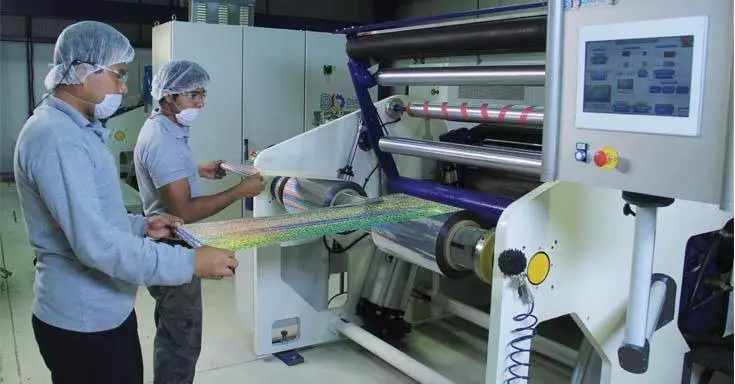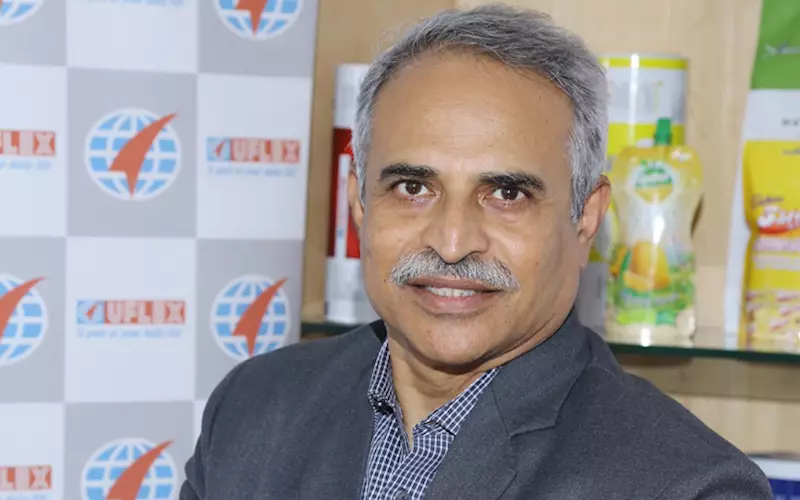Jeevaraj Pillai: The impact of Covid-19 can be ascertained based on how fast we return to normalcy
Rahul Kumar of WhatPackaging? speaks to Jeevaraj Pillai, joint president - packaging and new product development, Uflex, on the impact of the ongoing lockdown
09 Apr 2020 | By WhatPackaging? Team
What has been the lockdown’s impact on the packaging industry?
Many industries have been hit by the ongoing lockdown. Agencies such as Moody’s moderated their growth expectations for India from a rate of 5.3% to 2.5%. However, one would agree that during any crisis, the consumption levels for essential commodities such as food and medicines increase due to fear-mongering and hoarding of stocks. Hence, packaging which caters to these lifeline industries doesn’t suffer from a de-growth.
What about the impact on your business?
Since we are an essential service sector, our plant is open albeit with minimal staff. We are trying to support the packaging demands of the FMCG and pharmaceutical sector. There is a surge in demand in the short term however, with constraints on the supply chain side, we are likely to get impacted in the medium and long term, both in domestic and international markets, till such time the pandemic gets eradicated. Thus, the overall impact of the pandemic on our business can be ascertained based on how fast we are able to contain its spread and return to normalcy.
What was your immediate plan of action and how were you able to execute it?
The lockdown was declared in just a matter of a few hours, however, since packaging is an essential service, we were able to obtain necessary permission from the local authority to resume our production process. But with minimal staff and by following all necessary preventive measures. Despite the permissions available, the biggest bottleneck, as of now, is the continuity of the supply chain. Though the government has eased the norms to allow movement of goods, there are multiple challenges on raw materials and logistics availability and the cost for movement of goods have become exorbitant.
As there is a possibility that the lockdown might extend, what will happen if these challenges continue to occur?
We see these challenges as a temporary phase since the government has been taking several positive steps to not only prevent the spread of the virus, but also ensure that the supply of essential commodities to consumers remains uninterrupted. For Uflex, the advantage of working across the value chain of flexible packaging helps us to be better placed to overcome this challenge.
What steps have you undertaken for employee’s safety at your production units?
At our plant, our staff (barest minimum) is being thermal screened daily. Any employee who has any signs of fever, cold or cough has been advised to stay at home. Timely sanitisation measures are also being undertaken and social distancing is being maintained as well. For the rest of the staff not attached to production directly, we are encouraging them to work from home. Even in the last few weeks preceding lockdown, we had enforced measures related to travel restriction and frequent sanitation cycle, across all our premises. In a bid to discourage gatherings, we had suspended all training activities and were encouraging our employees to make use of virtual meetings.

Uflex's medical team is available round-the-clock to attend to healthcare concerns of its workers
How have you managed to be connected with your customers?
What we are facing is an extraordinary situation and such times call for extensive coordination. Especially, when it comes to delivering qualitative output and customer service with the fastest turnaround time, despite the challenges one is facing. Our sales, marketing and leadership teams are chipping in to engage with customers, on a regular basis. We have made use of phone and video calls, and of course, emails to have uninterrupted internal and external coordination with our partners and customers. We have also been making use of social media tools to get our message across to customers and consumers. We have always been customer centric and our strong lineage has helped us keep our customers assured of our services, during these tough times!
Your take on the government’s efforts to fight Covid-19?
In the wake of the outbreak, the government of India has been taking innumerable steps to prevent the spread of the virus and ensure that no one is deprived of access to essential items during the lockdown. This is a gargantuan task and we appreciate the Central and State governments’ efforts to ensure it. We are also thankful for being granted the status of ‘essential services’ to run our packaging plant. However, I would suggest that the government should ease movement and working conditions for units that manufacture essential goods and let its supply chain be run seamlessly.
How can this happen?
This can only happen if the government disseminates information to local level authorities on the maintenance of the supply chain ecosystem for essential goods, with the same intensity, as it is communicating other measures related to the lockdown. Also, the local authorities need to let the companies decide on the number of workers that would be needed to function at minimum capacity, fulfilling the requirement of the work in a manufacturing unit for effective operations.
What about the shortage of important constituents for packaging?
The whole ecosystem of supply chain in the industry has been disrupted, due to the lockdown. Many businesses that are important in the supply chain of packaging are not being allowed to run or lack the wherewithal to run its plants with the current resources of manpower. This is definitely leading to a shortage of raw materials as well. For example, we are facing a shortage of inks and adhesives that are an important fraction of the final packaging for daily essentials and pharmaceuticals, as those plants that manufacture raw materials are yet to get permission to operate.
So how are you tackling this situation?
We are doing our best with the available resources, be it human or material. We are in constant touch with other convertors and SKUs to figure out a way to source raw materials. Also, as I mentioned earlier, having the advantage of working across the value chain of flexible packaging, we are better placed than others in this industry on availability of raw materials, though we too are unable to run our packaging plant with full capacity.
Do you invest in health care and is there a robust system in place?
Our medical team is available round-the-clock to attend to healthcare concerns of our workers at the units. In case someone needs attention, they are guided to the infirmary and given the necessary medication. We also have our workers and their families covered by medical insurance.

Timely sanitisation measures and social distancing is being maintained at Uflex units, says Pillai
Do you feel the situation has brought the value of packaging into limelight?
Packaging is a core industry that literally binds the world together. Among our clientele, we have leaders from sectors as disparate as pharmaceuticals, FMCG, groceries, F&B and more. At times of need such as these, we will not let our clientele down, and it is important to understand that packaging is truly a bellwether of the economy and of consumption. Therefore, it is important for society to understand that packaging, an aspect that touches every life on Earth, is not a luxury. It is a necessity.
Will this bring a paradigm shift in the way packaging is perceived?
Definitely, the way packaging was perceived earlier especially that of plastic packaging will see a change. Plastic was much demonised earlier. However, plastic has proved to be an important constituent in helping overcome this challenge and save lives, be it its application in healthcare or its use in packaging that is necessary to keep food and medicines packed safely and hygienically to make it available daily to the masses. The consumers are worried about picking up fresh produce off the supermarket shelves and are preferring plastic packaging.
Your message to the industry
Society and packaging manufacturers need to work hand-in-hand to ensure that we keep plastic, an integral part of packaging, within the economy and out of the environment. That is the message that should go out from the exemplary handling of this situation, by the packaging industry at large.











 See All
See All